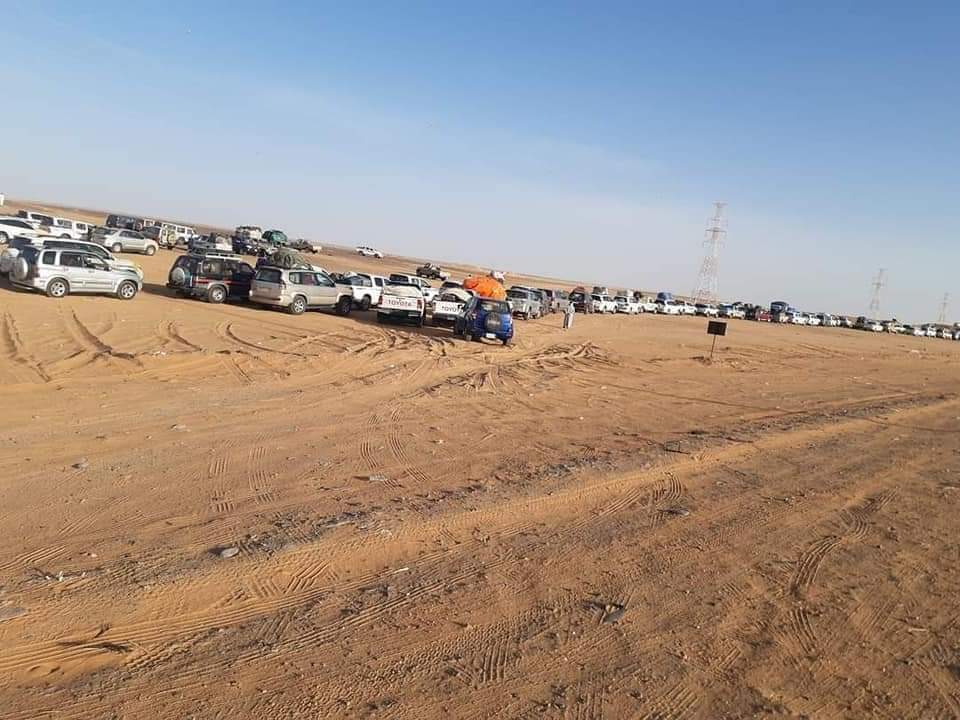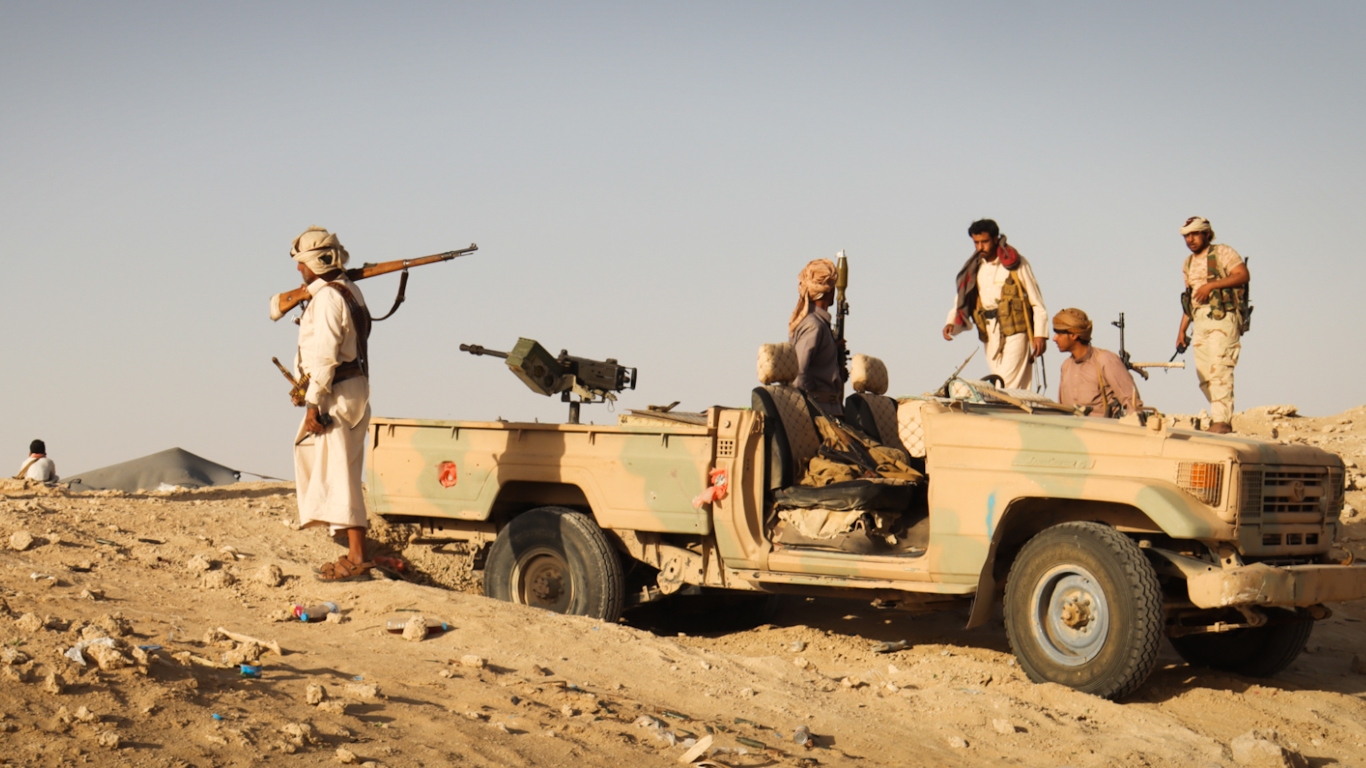SANA’A, YEMEN — Adel al-Hajajji is a proud man but, with a pregnant wife and three young mouths to feed, he can’t afford to wait around for a miracle. Instead, he has taken to wandering the streets of Sana’a, gathering discarded plastic water bottles to sell to the recycling center near his home in al-Rawdah. The meager earnings net him just enough to provide his family with a modest iftar, the evening meal that marks the end of the day’s fast during the month of Ramadan. The meal usually consists of bread and water but on occasion neighbors will bring by Saltah, Yemen’s national dish made of rice and potatoes, with meat blended in during more prosperous times.
Before the war, Adel was relatively well off, with a stable government job. He fasted during Ramadan without a passing thought about where his next meal would come from. In 2015, when the Saudis invaded and food become harder to find, he began to receive Ramadan meals courtesy of Muslim charities from wealthy patrons in the Gulf. This year, though, Adel says those charities have told him they could no longer donate to Yemen due to the blockade and subsequent crackdown from Saudi authorities, who claim that charity could fall into Houthi hands.
The Kingdom has ramped up efforts during Ramadan to stem the tide of charitable giving under the pretext of unifying relief efforts under the umbrella of the King Salman Humanitarian Aid and Relief Center. Of course, any aid that does arrive does not reach the most populated areas of Yemen, which are under Houthi control, leaving most of the country effectively cut off from aid.
No Ramadan return
To make matters worse, the Saudi government has banned thousands of Yemeni expatriates from returning to Yemen to reunite with their families during Ramadan and bringing with them the money they’ve earned working low-wage construction and other hard-labor jobs for the Kingdom’s wealthy. The Kingdom has kept hundreds of Yemeni expatriates trying to return home detained at the al-Wadiah crossing since March 24, under the pretext that their SUVs are banned from crossing the border as they could potentially be used in battle. Videos shared on social media show massive lines of pickups and SUVs unable to move and reports are surfacing that Covid-19 is quickly spreading through the hundreds of families detained at the border.
*بخصوص الدفع الرباعي*
للأسف لا جديد يذكر وغير صحيح اي اخبار في صفحات فيس بك كلها اخبار تضليل لطمس معانات العالقيناخوكم صالح العقيلي #عالقين_منفذ_الوديعه pic.twitter.com/2IdtKFVom1
— منفذ الوديعة الجمارك اليمنية (@salehshgran1) April 11, 2021
The Sana’a-based Land Transportation Regulatory Authority said in a statement on Saturday that nearly 2,000 vehicles owned by families trying to return home from Saudi Arabia have been held at al-Wadiah for over 20 days. Reports have also surfaced of widespread abuse by Saudi authorities, who are accused of beating stranded motorists with electrified batons when they tried to hold a vigil on April 5 to protest their detainment.

Rows of SUVs lined up for miles at the al-Wadiah crossing between Saudi Arabia and Yemen. Photo | Yazan
Even the Geneva-based human rights organization SAM, which is often quite light-handed in its criticism of Saudi Arabia, spoke out about the situation. The organization claimed that Saudi authorities have been blackmailing families detained at al-Wadiah, forcing them to sell their SUVs for pennies on the dollar before they can reunite with their families in Yemen.
Oil gets the world’s attention
Despite the magnitude of the humanitarian disaster in the country, the primary focus of the international community, including the UN, has been the impending Houthi takeover of the oil-rich Marib province. As Adel al-Hajajji put it, “the lives of Yemenis suddenly become the concern of the international community, particularly America and its allies, when it comes to oil, as usual.”
On March 18, the UN Security Council condemned the Houthis for trying to dislodge the Saudi-led coalition from Marib, claiming they violated a ceasefire that the Coalition never even began to observe, according to local reports. Linda Thomas Greenfield, the U.S. ambassador to the UN, claimed that “the Houthi offensive in Marib continues to take Yemeni lives — including those of internally displaced persons.” The Houthis issued their own statement in response, saying, in part, “the Security Council and the United States need to condemn the killers of Yemeni people, not exalt them.”
The battle for control over Marib still rages, even during Ramadan. Saudi forces have successfully slowed the advance of the Houthis and their allies in the province’s eastern al-Zour region, home to a sprawling camp for internally displaced people. Ali Mohammed Ta’iman, Marib’s provincial governor, has accused Saudi forces of using the refugees as human shields, adding that they have refused all attempts to allow the refugees to move to safer areas. The media bureau of Yemen’s army, loyal to the Houthis, released a video showing Saudi Coalition military vehicles inside the camp.
As the Houthis close in, Saudi forces are increasingly showing their desperation. In a move that mirrors accusations against the Kingdom in places like Syria and Libya, local reports indicate that Saudi Arabia recently reinforced its ranks in Marib with Salafist mercenaries brought in from the battlefields of Azerbaijan, Libya and Syria, combatants known for their effective use of armed Turkish drones.
Turkey, Muslim Brotherhood weigh in
The foreign fighters, long a staple of proxy conflicts across the Middle East, fight under the banner of the Al-Islah Party, the Yemeni branch of the Muslim Brotherhood. Just before Ramadan, a large group of Syrian mercenaries is reported to have arrived in Marib. A Houthi official told MintPress that most of the fighters crossed the sea from ports in Somalia, while others crossed the border into Yemen from Saudi Arabia. “Many of them were killed and injured in direct confrontation, by ballistic missiles and by drone attacks.” The official went on to say that Turkish-built drones have already been spotted participating in the fighting. In March, a Turkish Karayel armed drone was downed in al-Jawf, an area adjoining Marib.
Just as it transferred Syrian mercenaries to the conflict zones in Libya and Azerbaijan, Turkey — the financial and spiritual capital of the Muslim Brotherhood — is now doing the same in Yemen’s oil-rich Marib. Both Islah and Houthi sources told MintPress that Saudi Arabia and Turkey are cooperating in Marib, the last major stronghold in Yemen of both Saudi Arabia and the Muslim Brotherhood. Usually at political loggerheads, sources say Islah Party leaders have worked with Qatar, another Muslim Brotherhood stronghold, to mediate between Saudi Arabia and Turkey, using their shared desire to retain influence in Yemen as a carrot for rapprochement. In a recent statement uncharacteristic of the Turkish government, the Turkish foreign ministry said “Turkey stands with Saudi Arabia and its people against the Houthi attacks that target Saudi oil facilities.”
The Houthis, for their part, are not concerned with the prospect of Turkish intervention. Abdul Wahab al-Mahbashi, a member of the Ansar Allah Political Council, said that Turkey will likely rely on mercenaries, similar to their interventions in Libya and the Nagorno-Karabakh (Azerbaijan). “Invading Yemen will not have a happy ending for Erdogan himself as well as the country’s government and military,” he insisted.
Last June, MintPress revealed that Ankara had begun to send Turkish advisors, experts and weapons to Marib and was recruiting Libyan and Syrian mercenaries for the fight, promising high salaries and an easy win. Now, nearly one year later, the Turkish intervention has increased in the wake of President Recep Erdogan and King Salman’s reconciliation last November ahead of the G20 Summit.
Mercenaries, drones, and bombs
The Violations Documentation Center in Northern Syria, a local group that tracks and reports human rights violations, released a report stating that Turkish intelligence services had assigned Syrian jihadist leader Kamal Taha Al-Faihan, nicknamed Abu Faisal Al-Mujahid, to recruit Syrian fighters to send to Yemen. According to the report, the fighters were offered $2,500 monthly; $100 of this amount would be deducted for document expenses, fighters would receive $400 in cash initially, and the remaining $2,000 would be paid to their families after the move to Yemen.
Local reports and leaked audio indicate that Turkey is pursuing the same recruitment strategy in Marib. The Syrian news outlet Shaam Times reported that 300 Syrian fighters have already joined the ranks of the al-Islah militia; and Yemen’s North Press Agency, citing a source inside the Syrian armed extremist group Sultan Suleiman Shah, reported that the Syrian National Army, another armed militant group backed by Turkey, “has been working for weeks to prepare dozens of militants to send to Yemen.”
Meanwhile, neither Ramadan nor hopes that U.S. President Joe Biden will reverse course have offered a reprieve from the onslaught of Saudi Coalition warplanes. Multiple civilians, including two children, were killed last Wednesday in a Saudi bombing in Saada just one day after Biden announced he would proceed with over $23 billion in weapons sales to the United Arab Emirates, a key player in the war on Yemen. Human Rights Watch described the move as the U.S. “backing out of President Joe’s pledge.”
Feature photo | Tribesmen allied with the Houthis patrol a frontline near Al-Jadafer village in Marib, along the governorate’s border with Al-Jawf, on September 6, 2020. Ali Owidha | Sana’a Center
Ahmed AbdulKareem is a Yemeni journalist based in Sana’a. He covers the war in Yemen for MintPress News as well as local Yemeni media.
The post Ramadan Brings No Relief for Yemen as Saudis Block Charities and Turks Unleash Foreign Mercanaries appeared first on MintPress News.
